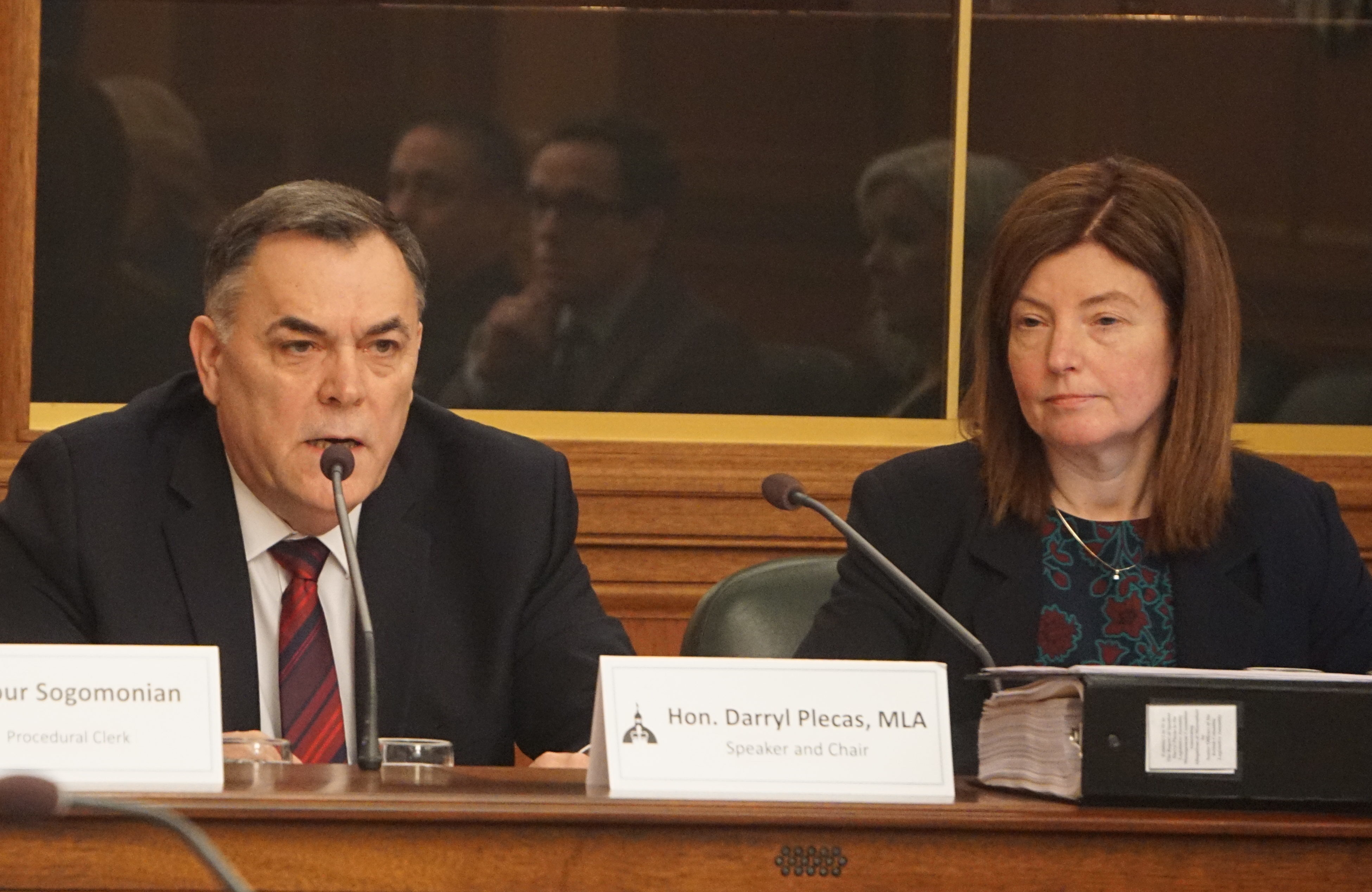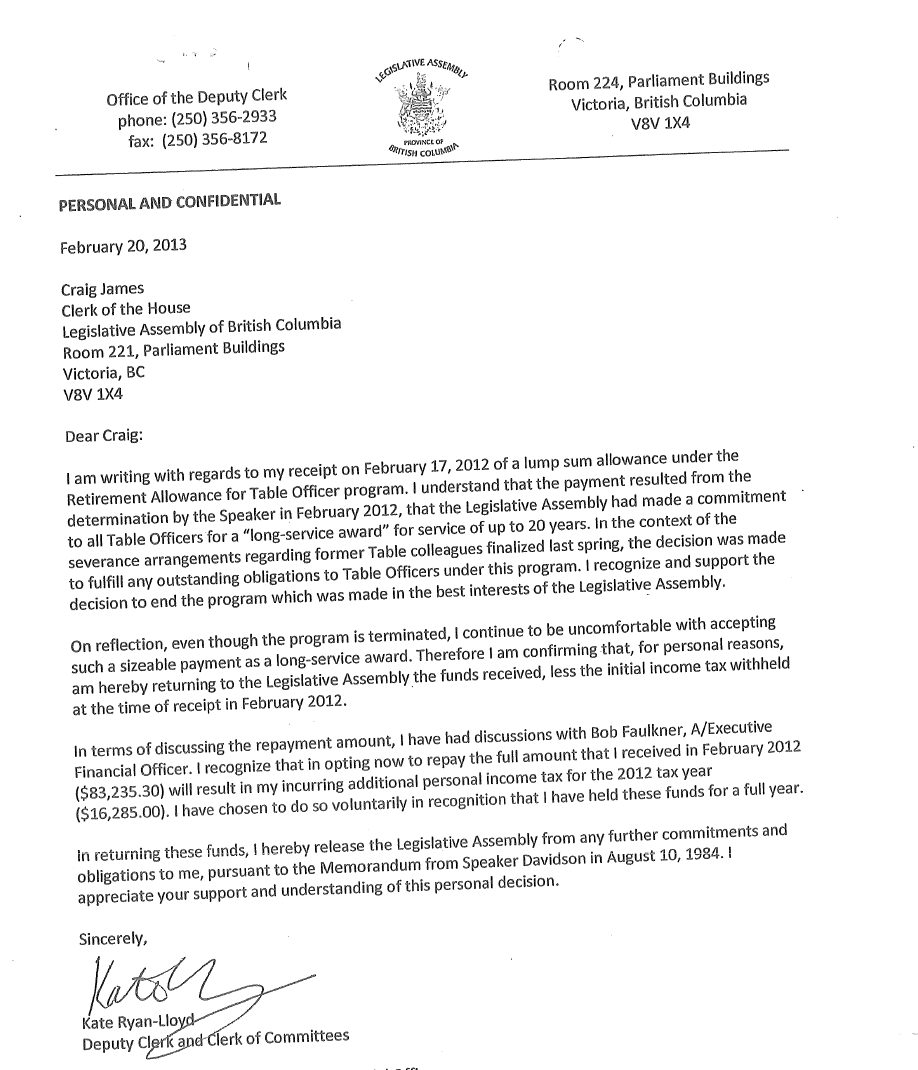
Bob Mackin
According to Speaker Darryl Plecas’s bombshell report, suspended British Columbia Legislature Clerk Craig James and Sergeant-at-Arms Gary Lenz didn’t just enjoy luxury travel, custom-tailored suits, shiny watches and major league baseball tickets on the taxpayer tab.
They also hatched numerous schemes aimed at collecting insurance benefits, retirement allowances and pay-in-lieu of vacation to pad their six-figure salaries.

Plecas (left) and Ryan-Lloyd on Jan. 21 (Mackin)
The most-egregious appears on page 22 of Plecas’s Jan. 21-published report on allegations of misconduct against James and Lenz. It happened in late October of last year, so close to the duo’s sensational Nov. 20 suspensions that it appears to have been the tipping point for Plecas.
As Plecas tells it, an employee of the sergeant-at-arms department had been diagnosed with a serious degenerative health condition. It was so serious that the man’s doctor advised him to get his affairs in order. Plecas chose to identify him only as “CD” and, for understandable privacy reasons, did not include documents about his situation with the report’s appendices.
Plecas wrote that James and Lenz created a new job for CD, so that he could work at home and still be paid as his health deteriorated. In the event that he died on the job, his life insurance benefit would pay three times the salary he was receiving as at the time of death. The plot did not stop there.
“Mr. Lenz said that CD’s plan was to commit suicide while he was still in employment, and before his condition deteriorated too far,” Plecas wrote. “I had serious concerns about this, primarily because it appeared to establish conditions that effectively incentivized suicide, but also because of the implications of the scheme in terms of the proposed use of public funds. I did not react to it at the time but I knew I would not be approving any such action.”
Plecas wrote that James came to him almost a year earlier, in November 2017, with two pieces of paper, both containing a typed-out paragraph, seeking Plecas’s signature.

Darry Plecas’s June 2018 letter to Craig James, rescinding bonus payments (LAMC)
“One of these related to a life insurance benefit for him. He said he needed my signature as confirmation that he was entitled to a life insurance policy in the amount of three times his annual salary. He explained that everyone else at the Legislature had life insurance and that it was something he was entitled to receive. The other paper related to salary and benefits (including life insurance) for the sergeant-at-arms.”
“I can’t believe he’s doing it again”
James and Lenz were suspended with pay on Nov. 20 and escorted from the Parliament Buildings. When they held a news conference the next week at their lawyers’ office in Vancouver, they denied any wrongdoing, pledged to co-operate with the investigation and demanded their immediate reinstatement.
James made a second request for life insurance early in November 2018, with a piece of paper with his name on top and language that would provide him with life insurance benefits.
“He asked me to sign it,” Plecas wrote. “I did not know why he was asking this, but I inferred that the document I had previously signed a year earlier, which purported to do the same thing, must have been ineffective for some reason. I said I would need to think about it.”
Last spring, Plecas wrote, James tried a similar tactic, asking Plecas to sign a piece of paper with one paragraph that was not on letterhead. James proposed a transition payment for executives with more than 10 years service at the Legislature and who had resigned. The Legislative Assembly would pay an amount equal to 12 months salary. For James, that would be more than $347,000, on top of his pension, and $218,000 for Lenz.
“My recollection is that the document provided to me named this allowance as applying to the clerk, the sergeant-at-arms, and the executive financial officer, Hilary Woodward,” Plecas wrote. “I was shocked to be presented with this request directly and so abruptly, as it was a significant liability, there was no apparent justification for it, and it would have to be cleared with [Legislative Assembly Management Committee] and the Finance and Audit Committee, as Mr. James well knew. I knew it hadn’t been cleared with those committees because I had been sitting on them for the past seven months and we had not discussed anything of the sort.”
Plecas thought that if he declined the request, James would leave with the evidence. Plecas decided to sign it and resolved to eventually rescind the benefit, which he did after speaking to James on June 26, 2018.
“After he left, I asked the deputy clerk, Kate Ryan-Lloyd, if she could meet with me in my office. I said words to the effect of, ‘I can’t believe what Craig James just asked me to sign’. I then explained it to her and said that I didn’t see her position included, but that Mr. Lenz’s and Ms. Woodward’s positions were named.”
Plecas said Ryan-Lloyd replied, “I can’t believe he’s doing it again.”
In 2012, she told him, that James received $257,000 under the guise of a “retirement allowance.”
“She said that a group of executives received smaller amounts at that time (totalling almost $660,000), including her, based on some program established decades earlier for senior house officers. However, she didn’t believe it was appropriate and told me that she repaid the amounts allocated to her. I have since confirmed her statements and looked further into the issue.”

A 2013 letter from Kate Ryan-Lloyd to Craig James, returning a retirement bonus (LAMC)
James “rarely to be seen at work on Fridays”
Speaker Walter Davidson, in 1984, created a benefits program for the three senior clerks and chief of the Hansard broadcast and transcript service, as they were not covered by the Public Service Act or executive benefit plan. James was hired Feb. 2, 1987.
A 2012 memo from then-speaker Bill Barisoff said James was entitled to an outstanding payment of almost $258,000. The Barisoff memo terminating the 1984-instituted benefit states that the body of the document made no reference to retirement. While technically true, the 1984 memo stated “upon vacating their respective offices… they shall be paid…”, and “…to be paid… in the year of termination of office.”
Ryan-Lloyd also opened up to Plecas about James’s high-flying travel expenses and cash payments in lieu of allotted vacation time.
Legislative Assembly policy states employees must use at least 15 vacation days a year, but could roll unused days into the next year or receive a cash payout.
The 1994 policy of a five-day limit was tripled to a 15-day cap in 2004. Plecas said multiple sources told him that James and Lenz regularly took payment in lieu of vacation days, but still took time off and did not work on holidays.
“In Mr. James’ case, for example, it was observed by a number of witnesses that he was rarely to be seen at work on Fridays. A review of relevant records confirms that Mr. James and Mr. Lenz record almost no official vacation – and in Mr. Lenz’s case, there have been years in which he has taken zero officially-recorded holidays, and instead been paid out in lieu for the entirety of his vacation days.”
The payments in lieu of vacation amounted to “unbudgeted cash bonuses” that, in some years, added up to a bonus worth a fifth of their salaries. In James’s case, Plecas wrote, there is evidence that he has done this since joining the Legislature and that human resources staff expressed concerns as far back as 1994.
“At times, in addition to requests to be paid out in lieu of vacation days previously accrued which could not be taken, Mr. James has requested to be reimbursed in advance for vacation days which he has not yet accrued, but which he presumably does not intend to take. In Lenz’s case, it was James who approved rolling over unused vacation days and paying out.
“Although it has not been possible based on the evidence reviewed to quantify with precision the total amount paid to Mr. Lenz and Mr. James in lieu of vacation, it is, at a minimum, several hundreds of thousands of dollars.”
A reporter rang the doorbell at James’s residence on a secluded cul-de-sac in Saanich several hours after the report’s release on Jan. 21, to seek his reaction to the allegations. James did not come to the door, but his wife, Christine, did. She said James would comment after consulting his lawyer. Before she asked the reporter to leave, Christine James said her husband is innocent.
James and Lenz have until Feb. 1 to file a response to LAMC.
The RCMP investigation that involves two special prosecutors is ongoing.
Support theBreaker.news for as low as $2 a month on Patreon. Find out how. Click here.










